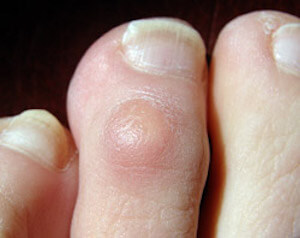 Plantar corns can generally be prevented by wearing properly fitted shoes that do not cause unnecessary pressure and/or compression to the toes. Corns fall into one of three different categories:
Plantar corns can generally be prevented by wearing properly fitted shoes that do not cause unnecessary pressure and/or compression to the toes. Corns fall into one of three different categories:
- Hard corns, the most common type, are small, concentrated areas of hard skin, typically within a wider area of thickened skin or callous.
- Soft corns, most often appearing between the toes, can be white or gray in color and are rubbery in texture.
- Seed corns are small and tend to occur on the bottom of the foot.
Is it a corn or a callus or a wart?
Plantar corns generally form for the same reason as calluses do, as a protective barrier. In fact, a corn is a kind of callus that is comprised of dead skin. the two can often be confused. Additionally, plantar warts might look similar to a corn or a callus. The three skin conditions are different though. Plantar corns are distinct but small in shape with a hard and well-defined center and the skin around a corn may be inflamed. Additionally, corns can be especially painful when they become thick whereas a callus, while it may be uncomfortable, should not be painful.

Treatment
Corns can be treated at home much like calluses. Epsom salts purchased over the counter can be added to the warm water bath your feet will soak in. Always thoroughly dry your feet with a clean towel and apply a hydrating moisturizer. This process should continue daily until you notice a softening of the corn. Once it is soft and not painful, try sloughing off as much of the corn with a pumice stone or an emery board. It may take a couple of weeks depending on how hardened the corn has become. Castor oil is an effective alternative to filing your corn away with a pumice stone or emery board. Following application of the castor oil, a corn pad should be used in order to help relieve the pressure from the area so that the corn can heal properly. These can be found at your local pharmacy along with other over-the-counter options that have proven effective in safely removing corns.
If the at-home, over-the-counter methods do not work, a podiatrist should be consulted. Call us today to set up a podiatry appointment at one of our Cleveland area locations.
